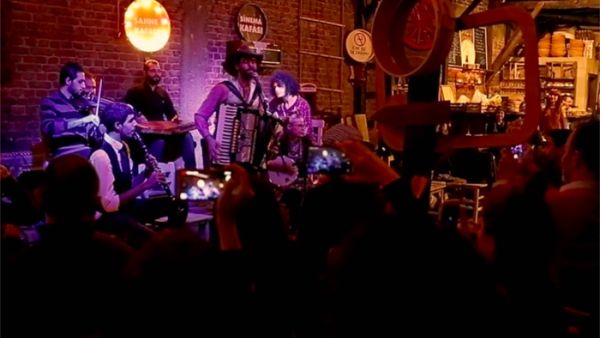Amid Istanbul's vibrant music scene, a small band has hit relative fame thanks to its curious musical blend and humanitarian purpose.
Country For Syria, formed by Owen Harris, an American accordionist, and Bashar Balleh, a Syrian guitarist, blend American Country music and Arabic folk songs - and uses its concerts to support refugee families.
Their aim, they say, is to create a small space for humanity at a time of rising nationalism and populism.
Harris and Balleh created Country For Syria in December 2015, and it happened by chance.
Balleh, 24, had arrived from Latakia, Syria, a year previously. He would give up on Europe in July of the same year after almost drowning on a deflated dinghy while attempting to cross the Mediterranean.
Harris, in his late twenties, also came to Istanbul in 2015, motivated to use his musical talents to good use for the refugee crisis.
"The refugee crisis is the obvious emergency in the world. That's the easiest place to help," he told The New Arab.
At each venue, the band collects money in a cowboy hat and donates it to a refugee family supported by Humanwire, an NGO for which both Harris and Balleh work. So far, Country For Syria has performed more than 75 concerts, supported around 70 families, and developed a diverse fan base.
Building bridges at the Bosphoros
Despite its humanitarian intentions, the band struggles in Turkey's climate of rising nationalism and populism.
"We used to play for Syrian children every week with an NGO. That was until the neighbours started throwing bricks at us," says Harris. "It's because it was for Syrians," claims Balleh.
Although Turkey has welcomed more than two million Syrians, they are becoming more and more resented by many. Nonetheless, the band remains committed to building bridges.
"The [musical] keys and themes are similar in Country music and Arabic folk songs," says Balleh. The two styles speak about murder, love, migration, and losing the homeland - and describe the mountains and rivers that people miss.
"First, we would segment the music, without mixing songs," explained Harris. But as they played, the two styles blended, and the lines between Country and Arabic styles blurred - becoming a bridge between two cultures.
As nationalism and populism grow in the US, Europe and Turkey, the fate of refugees is becoming more and more unsure.
"These past four years, locals have negatively changed their minds regarding refugees," explains Basak Oktay, a 27-year-old Turkish ukulele player.
She joined Country For Syria with a wish to promote acceptance and reverse this trend. "Here on stage, you can see the results instantly - compared with the projects that take months."
Within two years, the band has acquired a diverse group of fans following them from concert to concert. Originally, the fans could be divided into three groups: expats and NGO worker happy with everything; locals who were restive at the mixture of styles; and Syrians who preferred Arabic songs.
"As we developed our music blending styles, the three groups became one audience," Harris explains.
This article has been edited for length from the source material.








